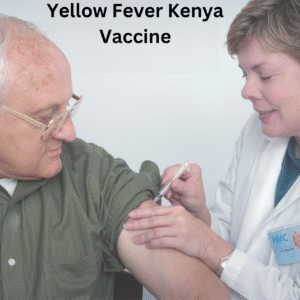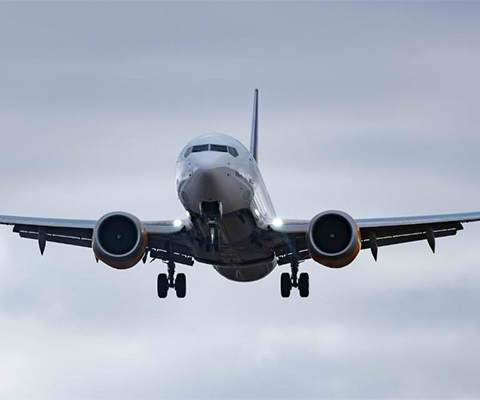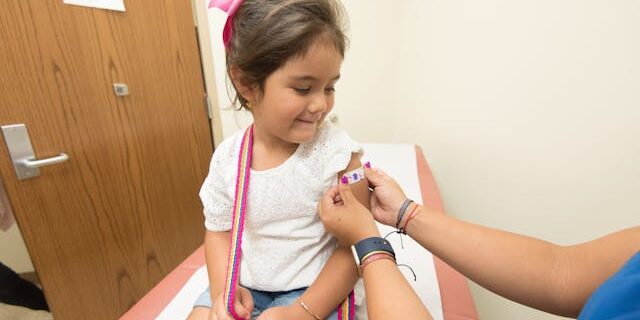By Christine Nabisswa
Kenya welcomes all visitors to its breathtaking landscapes, abundant wildlife, and vibrant cultures. To ensure a safe journey, travelers must follow the country’s health guidelines, including recommended Kenya travel vaccinations, which help protect visitors and residents from preventable diseases.
Yellow fever vaccination is mandatory for travelers visiting areas outside Nairobi, North Eastern, or Coast Province. Visitors from certain countries, including India, must present valid polio vaccination certificates. These travel vaccinations must be documented in the International Certificate of Vaccination.
General Health Tips and Kenya Travel Vaccinations for Visitors
It’s important to know the health risks and how to stay safe as you get ready for your trip.
Importance of Pre-Travel Health Consultations
Before arrival, visitors must consult a travel health specialist 4-6 weeks before departure. At immigration, you will be required to present vaccination certificates. You might not be allowed to enter if you don’t have the correct health documents. These rules help keep everyone safe during their visit to Kenya.
Travelers should remember that vaccination records must be original documents with official stamps. Photocopies or digital versions are not acceptable. The certificates must be in English or accompanied by certified translations. Following these requirements will help ensure smooth processing at border entry points.
Personal Hygiene and Food/Water Safety
Practicing good hygiene is vital in reducing the risk of illness. Always wash your hands with soap and clean water before eating and after using the toilet. If clean water is unavailable, use hand sanitizer with at least 60% alcohol.
Be cautious with what you eat and drink. Avoid consuming raw or undercooked meat and seafood. Stick to bottled or purified water and avoid using ice unless you are sure it’s made from safe water. Eat fruits you can peel yourself. Avoid salads and food from street vendors if the hygiene is questionable.
Protection Against Insect-Borne Diseases
Insect-borne diseases such as malaria and dengue are present in many parts of Kenya. Malaria is a significant concern, especially in rural and lowland regions. To protect yourself:
- Take antimalarial medication as prescribed.
- Use insect repellent containing DEET.
- Wear long-sleeved clothing, especially in the evenings.
- Sleep under a mosquito net treated with insecticide.
These measures can significantly reduce the risk of mosquito-borne illnesses.
Access to Medical Facilities and Travel Insurance
Medical services in Kenya vary by location. Nairobi and other major cities have private hospitals such as The Nairobi Hospital, Aga Khan University Hospital, MP Shah Hospital, and AAR Hospital that provide good care. Rural areas may have limited facilities. It is important to carry a basic first aid kit and essential prescription medicines.
Travel insurance, such as comprehensive plans and specialized coverage for medical emergencies, including evacuation, is highly recommended. This is especially important if you plan to visit remote areas where specialized care may not be available.
Recommended Kenya Travel Vaccinations
Here are the recommended vaccines for people visiting Kenya.
Routine Immunizations
Make sure you are up to date on all routine vaccines. These include:
- MMR (Measles, Mumps, Rubella)
- DTP (Diphtheria, Tetanus, Pertussis)
- Polio
- Influenza (seasonal flu)
Routine vaccinations protect against diseases common in many parts of the world, including Kenya.
Yellow Fever Kenya Vaccine
- Importance and Effectiveness
The yellow fever Kenya vaccine is one of the most important vaccinations for travelers. Yellow fever is a viral disease spread by infected mosquitoes. It can cause severe illness and even death. The vaccine is highly effective and provides long-term protection.
- Required for Travelers from High-Risk Countries
Travelers from countries with yellow fever must show proof of vaccination when entering Kenya. This requirement helps prevent the spread of the disease within Kenya.
- Vaccination Certificate Requirements and Exemptions
If arriving from affected countries, all visitors aged 9 months and older must show proof of yellow fever. Some travelers with medical exemptions may be allowed entry, but proper documentation is required.

A senior man receiving a yellow fever vaccine from a healthcare professional — Kenya Travel Vaccinations for older travelers.
Typhoid and Cholera Vaccines
Typhoid and cholera vaccines are recommended if you’re going to rural or less developed areas. Typhoid spreads through dirty food and water. Although less common, cholera outbreaks can occur in regions with poor sanitation, such as Dadaab and Fafi subcounties. Other areas experiencing cholera outbreaks include Tana River, Garissa, Wajir, and Nairobi counties. These vaccines are essential for extended stays in remote communities.
Rabies Vaccine
Rabies exists in Kenya and can spread through animal bites. The risk is low for most travelers. The rabies vaccine is a good idea if:
- You will work with animals.
- You plan to spend time outdoors or in remote areas.
- You are staying in Kenya for an extended period.
In case of a bite, seek medical care immediately, even if vaccinated.
Other Mandatory Vaccinations and Entry Requirements
Special Requirements for Travelers from Polio-Endemic Countries
Travelers from India, Pakistan, Afghanistan, and other high-risk polio countries must show recent polio vaccination proof (within 1 year). In compliance with global health recommendations, a valid certificate is required to enter Kenya.
Compliance with International Health Regulations
Kenya follows international health regulations by the World Health Organization (WHO). These rules protect travelers and local communities. Ensuring compliance with all required Kenya travel vaccinations is essential for smooth entry and a safe stay.
Health Tips by Region Based on Kenya Travel Vaccinations
Health risks in Kenya can vary depending on your travel location. Being aware of regional conditions helps you prepare properly.
Urban Areas (Example; Nairobi) vs. Rural and Remote Locations
Medical care and hygiene standards are generally better in cities like Nairobi and Mombasa. However, travelers should still be cautious about food and water.
Rural and remote areas often have higher risks of insect bites, foodborne illness, and limited access to healthcare. Additional vaccines such as cholera or rabies may be more critical in these areas.
Travel to Northern and Coastal Regions
The Northern regions of Kenya are more arid and underdeveloped. Medical care is limited, and malaria risk is high. Bring a medical kit and avoid traveling alone in very remote areas.
The coastal region, including areas near Mombasa and Malindi, is a hotspot for malaria. Mosquito precautions and antimalarial medication are crucial here. Waterborne diseases are also more common, so bottled water is advised.
Risks and Precautions in Wildlife and Game Park Areas
Kenya’s national parks and wildlife reserves are significant attractions. However, they come with specific health risks:
- Wear protective clothing to prevent insect bites.
- Do not approach or feed wild animals.
- Have up-to-date rabies vaccination if your trip includes close animal encounters.
Some parks are located far from medical facilities, so plan accordingly.
Additional Travel Health Tips
Staying Hydrated and Avoiding Heat-Related Illnesses
Kenya’s climate can be hot, especially in lowland and coastal areas. Drink plenty of clean water and avoid overexposure to the sun. Wear a hat and sunscreen, and take breaks in shaded areas.
COVID-19 Protocols (If Applicable)
COVID-19 entry and safety protocols in Kenya may change based on global trends. Travelers should:
- Check for current testing or vaccination requirements before departure.
- Carry proof of vaccination, if needed.
- Practice good hygiene, including mask use in crowded spaces.
These measures help protect you and those around you.
Need Help with Your Kenya Travel Vaccinations and Health Guide?
Ensure you’re protected with the right health tips and vaccines mentioned above. Travel Moran makes getting clear, updated advice on staying safe and healthy easy. Visit Travel Moran today and travel to Kenya with confidence.
FAQ: Kenya Travel Vaccinations and Health Guide
- What vaccinations are mandatory for Kenya?
Travelers to Kenya must show proof of vaccination against yellow fever. This is mandatory, especially if they come from a country with a risk of yellow fever.
Depending on the area you’re visiting, your healthcare provider may also recommend vaccines for malaria, typhoid, hepatitis A, and hepatitis B.
- What are the routine vaccines in Kenya?
Routine vaccines in Kenya protect against common childhood diseases like diphtheria, tetanus, whooping cough, polio, measles, mumps, rubella, and hepatitis B. Adults are also encouraged to keep their vaccines up to date, including the tetanus booster and flu shot.
- What are routine vaccines for adults?
For adults in Kenya, routine vaccines typically include:
- Tetanus, Diphtheria, and Pertussis (Tdap)
- Hepatitis B
- Seasonal Flu
- MMR (Measles, Mumps, Rubella)
- Pneumococcal vaccine (for those over 65 or at risk)
- What is the vaccination coverage in Kenya?
Vaccination coverage in Kenya is getting better, as the government continues to improve access to vaccines in both rural and urban areas. According to WHO, Kenya has made strong progress in vaccinating children, especially with vaccines like BCG, polio, and DTP (for diphtheria, tetanus, and whooping cough).
- What is the formula for immunization coverage?
Immunization coverage means the percentage of people who get the recommended vaccines. Here’s the formula:
Immunization Coverage (%) = (Number of children or adults vaccinated / Total target population) x 100
- What are the barriers to vaccine uptake?
Several factors contribute to the barriers to vaccine uptake in Kenya, including:
- Accessibility: Some rural areas may lack easy access to vaccination centers.
- Awareness: Lack of knowledge about vaccine availability and benefits can lead to reluctance.
- Cost: Although many vaccines are cheaper or partly covered, some may still find them too expensive.
- Cultural Beliefs: Misconceptions or fears about vaccines can deter people from getting vaccinated.
- What are the current challenges of vaccines?
Current challenges in Kenya regarding vaccines include:
- Supply Chain Issues: Disruptions in vaccine supply chains can lead to stockouts.
- Vaccine Hesitancy: Public mistrust, often driven by misinformation or myths, can prevent people from getting vaccinated.
- Equity in Access: Ensuring vaccines reach all regions, including remote areas, is an ongoing challenge.
- What are two possible vaccine problems?
- Side effects – Most are mild, such as fever or arm soreness. Serious problems are sporadic.
- Not always 100% effective – Some individuals may still become ill due to factors such as age, health, or storage issues.
- Can I get vaccinated upon arrival in Kenya?
Some vaccines, such as yellow fever, are available in Kenya; however, it is safer to receive them before travel. Consult with your doctor or a travel clinic before your trip to ensure you are prepared.
- Are malaria pills needed for Kenya?
Yes, in many parts of Kenya, especially in rural and coastal areas, it’s best to take antimalarial medicine and use mosquito repellent and nets.
- Do I need a COVID-19 vaccine to enter Kenya?
Rules change, but currently, COVID-19 vaccines are not required for entry. Check the latest travel advisories before your trip.
- How long before my trip should I get vaccinated?
Some vaccines take weeks to work. To ensure complete protection, visit a doctor 4–6 weeks before traveling to Kenya.
- Can I drink tap water in Kenya?
The water may be clean generally; however, for individuals with sensitive systems, it is advisable to consume bottled or boiled water as a precaution.
- What should I pack in my travel health kit for Kenya?
- Malaria pills (if prescribed)
- Mosquito repellent with DEET
- Sunscreen
- Basic first-aid supplies (bandages, antiseptic)
- Any personal medications
- Are hospitals or clinics available for tourists in case of illness or injury?
Yes, major cities and tourist areas often have access to good private hospitals. Some major hospitals in Kenya are Nairobi Hospital, Aga Khan University Hospital, MP Shah Hospital, and AAR Hospital.
If you’ll be visiting remote areas, having travel insurance, especially plans that cover medical emergencies and evacuation, is a good idea.










